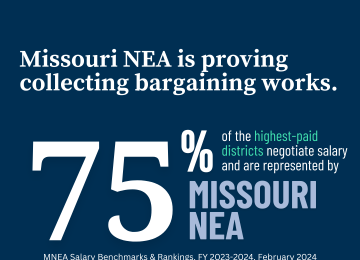New data shows a 2.1% increase in educator pay, but it is not enough to move Missouri up in the national rankings. In fact, we lost two spots in average teacher pay.
The National Education Association (NEA) releases four reports detailing the state of pay for teachers and education support professionals (ESPs) in Missouri and around the country.
JEFFERSON CITY, MO — Four new reports examining educator pay and school funding from pre-K through college reveal that despite growth in educator pay last year, chronic problems plague educators, including low wages and a lack of professional respect. The annual reports released by the National Education Association show that salaries continue to undervalue those tasked with preparing our children for their future, limiting the ability to attract and retain quality educators amid a continuing educator shortage.
The data released today include “Rankings and Estimates,” a report NEA has produced since the 1960s and widely cited as an authoritative source on average teacher salaries and per-student expenditures. NEA’s “Teacher Salary Benchmark Report” provides information from over 12,000 school districts on starting teacher salaries and salaries at other points of the teaching career continuum. The “Education Support Professional Earnings Report” offers a pay breakdown for school support staff, also known as education support professionals, working in K-12 public schools and higher education. NEA’s “Higher Education Faculty Salary Analysis” examines full-time faculty and graduate assistant salaries at the national, state, and institutional levels. Additionally, NEA released financial snapshots for four demographics: teachers at the preK-12 level, higher education faculty, and support staff at both the preK-12 and higher education levels.
WHY IT MATTERS LOCALLY:
The teachers in Missouri are the backbone of our democracy. As one of the most underappreciated and underpaid professions, we are seeing a shortage of educators, jeopardizing the future of our children. The data shows that while gains have been made in Missouri, teachers from pre-kindergarten to higher education are still not making enough. In fact, actual teacher pay for many has gone down when adjusted for inflation. While it might look like teachers are getting support, they are actually losing money, which has a direct impact on student learning.
Data highlights and trends:
The average Missouri public school teacher salary in 2023–2024 rose 2.1 % from the previous year to $55,132, but with inflation of nearly 3%, it actually results in teachers making only $447 more than in 2022-2023.
The average beginning teacher salary in Missouri was $38,871, which is a 5.5% increase from last year. However, Missouri only moved up one spot in the rankings from 50th in the nation to 49th, with Montana and Nebraska not far behind.
Education Support Staff, such as paraprofessionals, custodians, bus drivers, nutrition services, and school office support, make, on average, $34,052 per year in Missouri and are ranked 34th in the nation.
Both new educators and ESP fall far below the Living Wage of a single person or family of four to live in St. Louis County ($46,934/$113,142), Springfield/Greene County ($40,145/$90,555), Columbia/Boone County ($42,496/$94,619), or Kansas City ($47,524/$104,158).
37% of all full-time K-12 education support professionals earn less than $25,000 annually.
Despite the gains over the past year, Missouri teachers are still underpaid. If we want to start valuing the educators who teach our children, we must step up and advocate for fair pay. We are on the right track, but we must send a message to our legislators that they need to do more



